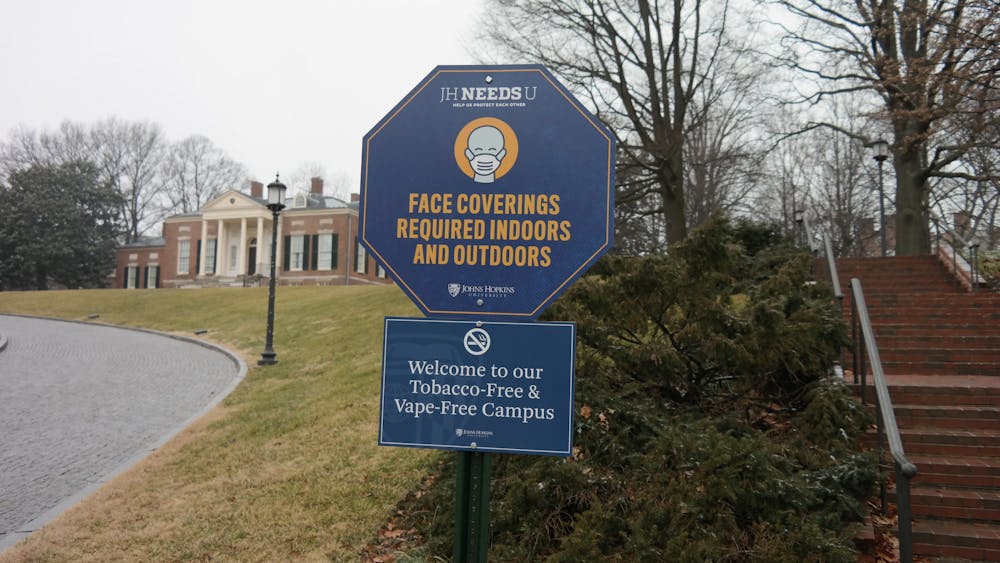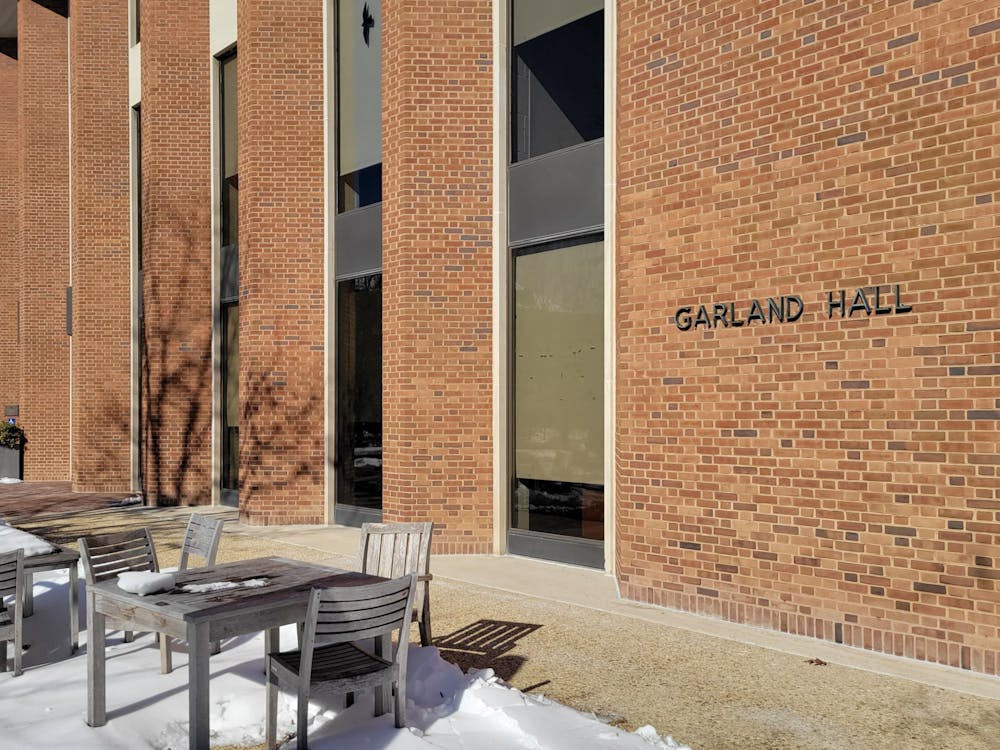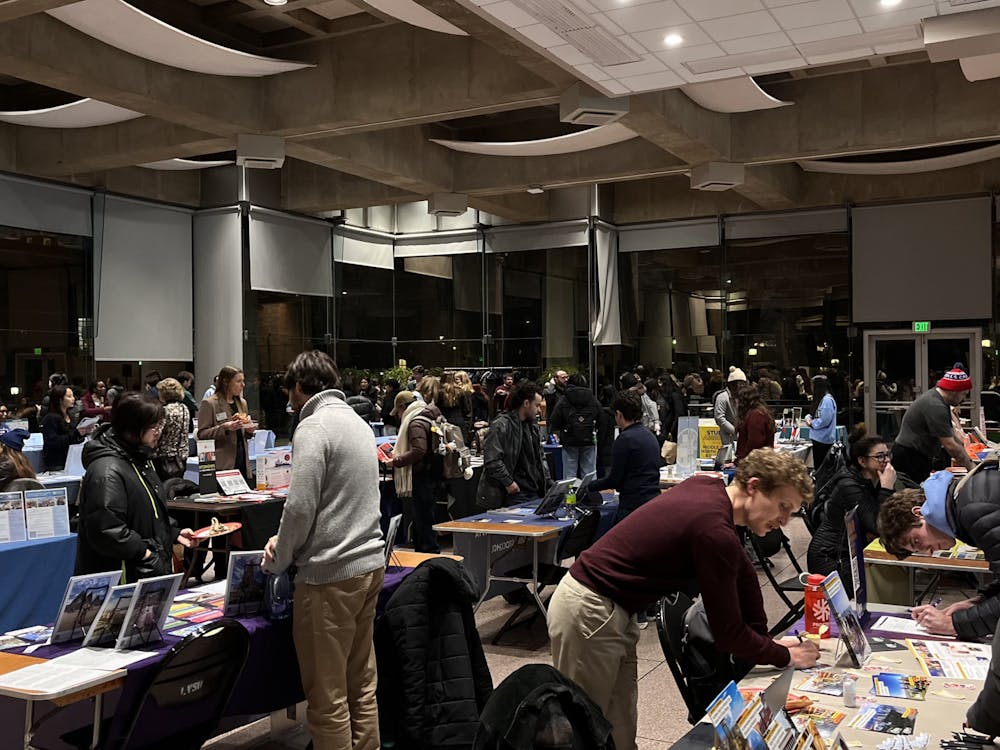Hopkins welcomed students back on campus for its hybrid spring reopening with limited in-person activities and housing. Students are required to adhere to a number of safety protocols related to COVID-19, including a mask mandate and asymptomatic testing.
The move-in process for University housing began on Jan. 16. Additional rules residential students must follow include mandatory biweekly testing, face coverings and social distancing. Mass gatherings are prohibited, and students are not allowed to enter residential buildings or dorm rooms not assigned to them. There is a blanket ban on having any guests, including other residential students, inside rooms.
Freshman Jason Lin stated that he has been able to safely socialize with classmates he had previously only interacted with on Zoom.
“There are obviously some restrictions, but the way the University has the guidelines set up, social interaction is still possible,” he said. “Overall, I found that the move-in process and being here in Baltimore has been really enjoyable.”
However, there have been incidents of students being removed from University housing for failing to adhere to various restrictions. By the time the semester began on Jan. 25, 11 students had been removed for violating guidelines, according to Vice Provost for Student Affairs Alanna Shanahan. Hopkins is providing a refund on housing for those students.
Freshman Jiacheng Li stressed that students living in Baltimore need to hold one another accountable.
“It’s necessary to protect everyone in the community,” he said. “We all signed the contract, we all paid the tuition and agreed to keep our campus safe from the virus.”
Brody Learning Commons, Milton S. Eisenhower (MSE) Library and the Rec Center will open in the first week of February with reduced hours and limited capacity. Students need to use the “Follow Me to the Rec” app to reserve workout time slots at the Rec Center. Baltimore City recently relaxed its restrictions on in-person dining, but Hopkins is for now offering only carry out options.
In-person classes are planned to begin on Feb 9. All students are required to have two negative tests from the week of Jan. 25 in order to attend. Students in off-campus housing who arrived earlier in the month and have been tested multiple times still need two additional negative test results this week to attend in-person classes.
Lin said he looked forward to attending in-person labs for his coursework in chemistry and biology.
“Most people are excited about social interaction, but I am also excited to finally get some hands-on experience working in a laboratory,” he said. “I know that is something I really wanted to do and why I applied to Hopkins. There’s just so much research available and I wanted to get some lab experience before I work in a lab myself.”
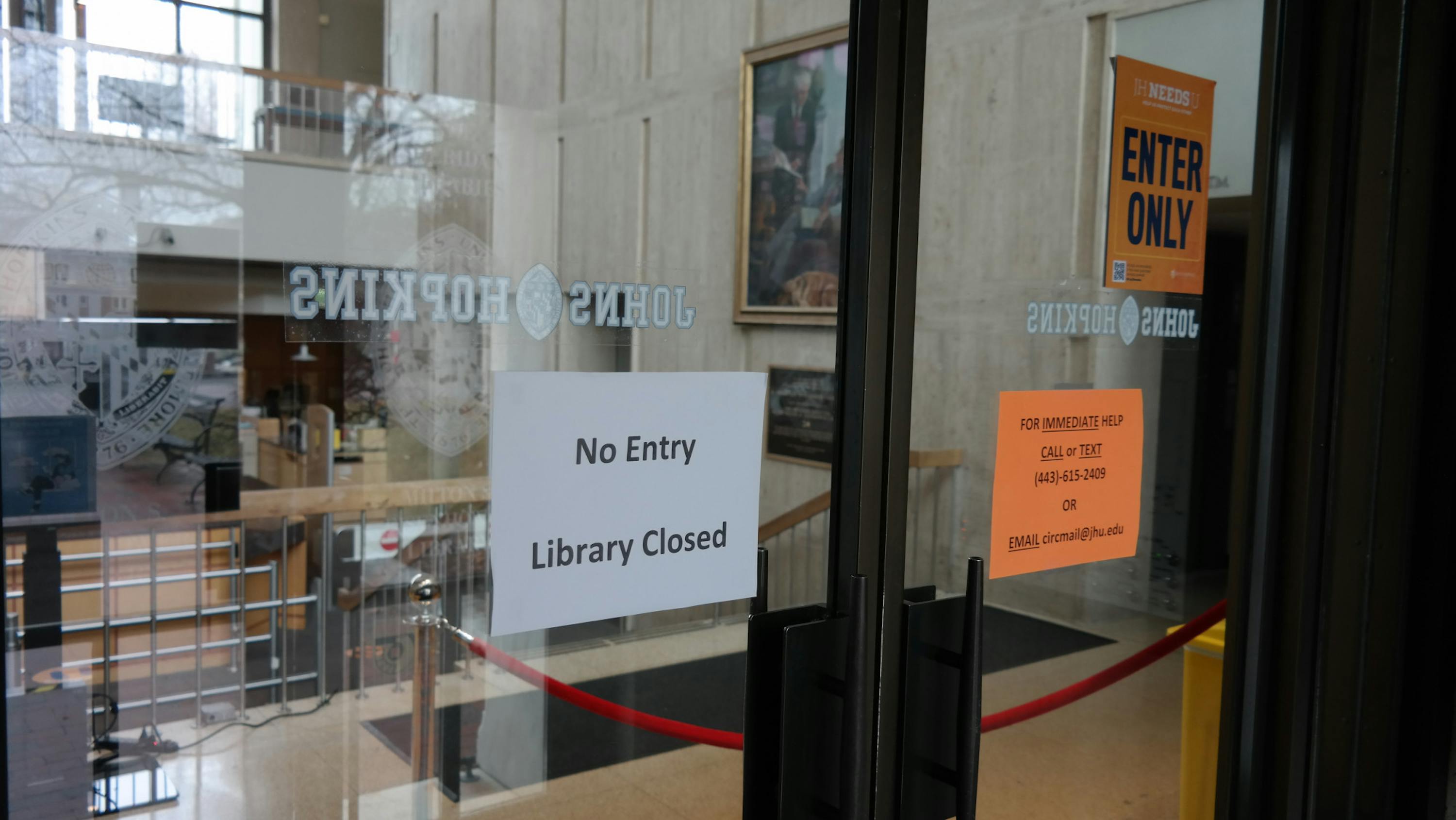
COURTESY OF CHRIS H. PARK
Brody and the MSE Library and Brody will reopen in early February.
Over the past seven days, Hopkins has conducted 6,685 student tests, 23 of which were positive. Baltimore City reported seven day average daily new cases of 187.7 as of Thursday evening, with a positivity rate of 4.9%.
At the beginning of the fall semester, a small cluster of students tested positive for COVID-19, sparking University-wide efforts to highlight the importance of taking precautions to slow the spread of the virus. No similar outbreak has occurred thus far both on and off campus.
Dr. Roanna Kessler, the medical director of HelWell, noted that testing trends on campus have been heading in the right direction.
“We have a positivity rate of less than 1%. Considering the rates in the country right now, that is very low,” she said. “Testing has been going really well so far.”
Hopkins affiliates can schedule tests and receive results through MyChart. Kessler explained that results typically will be released within 24 hours of taking the test but may take longer if the lab decides to re-run its tests.
“If your test has not come back in 24 hours and you are not symptomatic, it’s okay to sit tight and wait,” she said.
The University has also launched a social compact that asks affiliates to sign a commitment to ensure the health and safety of the Hopkins community during the pandemic. At least one leader of a registered student organization is also required to undergo training sessions on COVID-19 precautions before groups can reserve spaces on campus this spring.
Although signing the compact is not mandatory, Shanahan expressed her hope that students to support its guidelines.
“It reinforces our most basic policies, procedures and recommendations surrounding how we ideally keep our community safe,“ she said. “I am hopeful students will embrace this compact, support it and live by it. So much of our ability to be here and be safe does rely on our community adhering to these standards.”
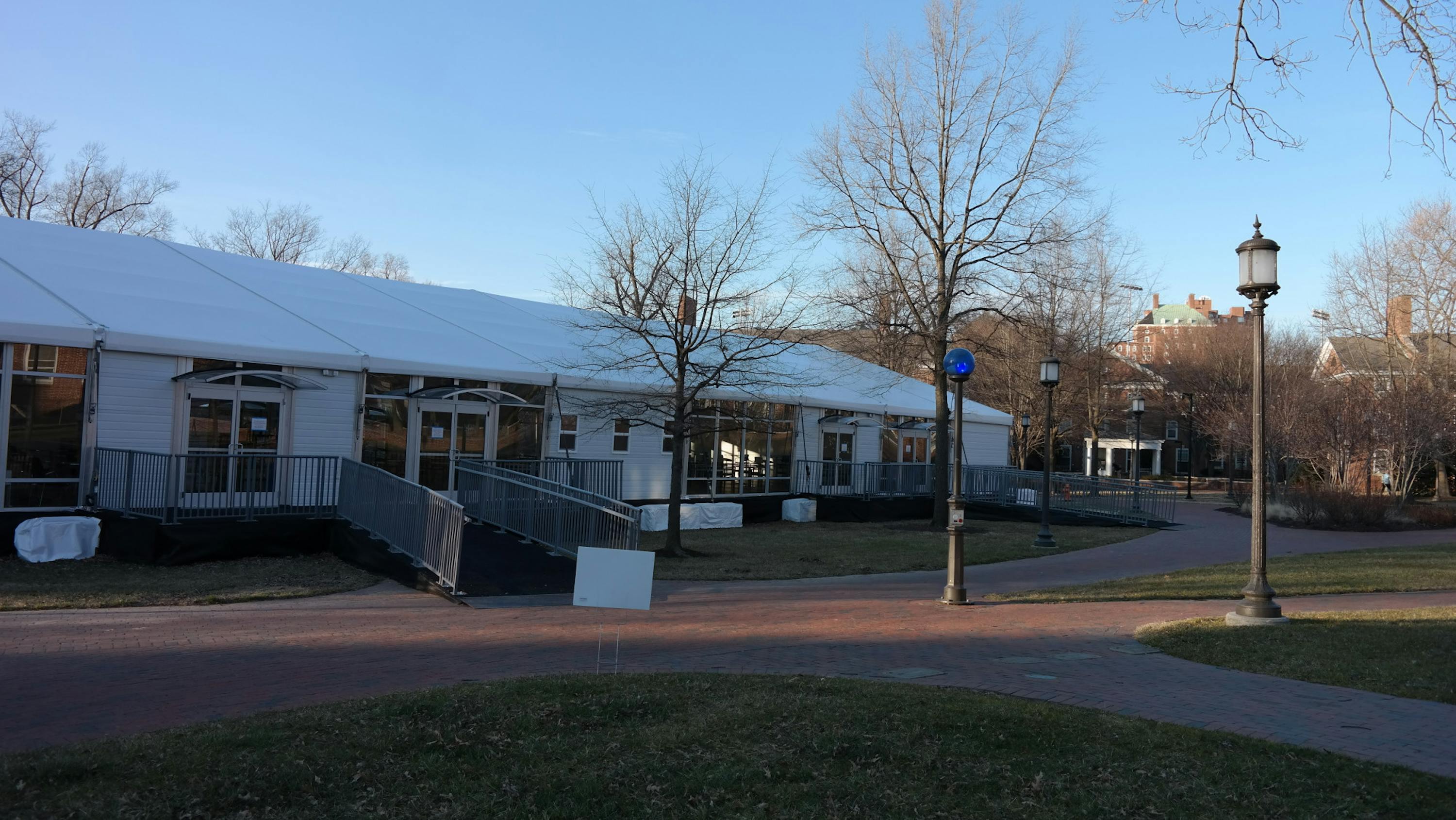
COURTESY OF CHRIS H. PARK
Construction on the social distancing tent was completed over winter break.
In an email to The News-Letter, senior Catherine Siu emphasized that the various restrictions on campus life not only protect the health of students but also their neighbors.
“Current restriction on students is necessary if we’re going to have any chance of a spring semester here on campus,” she wrote. “While I understand that this may come as a disappointment to some students, we need these restrictions to keep everyone safe and the Baltimore community safe as well, given that colleges have been a hotspot for COVID infections.”
Siu has been using the Facebook meme page associated with the University to criticize students allegedly violating various safety restrictions. Some students have taken to social media and class-wide group chats to condemn those not adhering to rules on social gatherings, sometimes identifying specific individuals.
Sophomore Marc Helou acknowledged the importance of the rules but noted his reservations about some aspects of scrutiny on following them.
“We’re all subjected to lots of scrutiny to follow protocol perfectly, especially since it’s the beginning of the semester,” he wrote. “I also don’t think slight infractions — distancing 4 feet from others as opposed to 6 feet from others, while also following all other guidelines — warrant publicly ‘outing’ anybody. We’re all human, and we’re trying our best.”
The University has encouraged students to report non-compliance to the “Speak 2 Us” hotline online or via the phone.
Siu described the hotline as an ineffective avenue to report violations in real time.
“People should be reporting major violations to Hopkins. The online form to report, however, has a five to six business [day] delay before they get back at you, which makes it a bit pointless since some violations are immediate or temporary,” she wrote. “For example, if you see a bunch of people on the beach that you don’t know, reporting it with a massive delay in turnaround makes no sense.”
According to Jennifer Calhoun, Shanahan’s senior advisor, the hotline was not designed for rapid response. She added that, since the beginning of the year, there have been 14 student-related COVID-19 complaints on the hotline.
“It is a University-wide tool that takes in complaints for all kinds of things in addition to COVID-specific, student-related complaints. It is a third-party entity that receives those calls,” she said. “If we get a compliant in advance, we will certainly try to address it in real-time and have had some success in that area recently.”
Calhoun instead recommended that, to address real-time concerns, students reach out to Campus Safety and Security at (410) 516-4600 or its LiveSafe App.
Junior Natalia Aguilar voiced her appreciation for the University’s efforts to monitor and prevent activities that violate safety restrictions.
“I was here over the summer, and I definitely had to call the HopCops on a few summer parties,” she said. “They’re really good at responding that way, and I do like that they had such an immediate response to a group of people that were on the Beach the other day. Even with some people doing the right thing, just a few people not following the rules is enough to cause an outbreak.”
Symptomatic students should reach out to JHCCC at (833) 546-7546, seven days a week, between 7 a.m. and 7 p.m. Students can alternatively reach out to HelWell.

